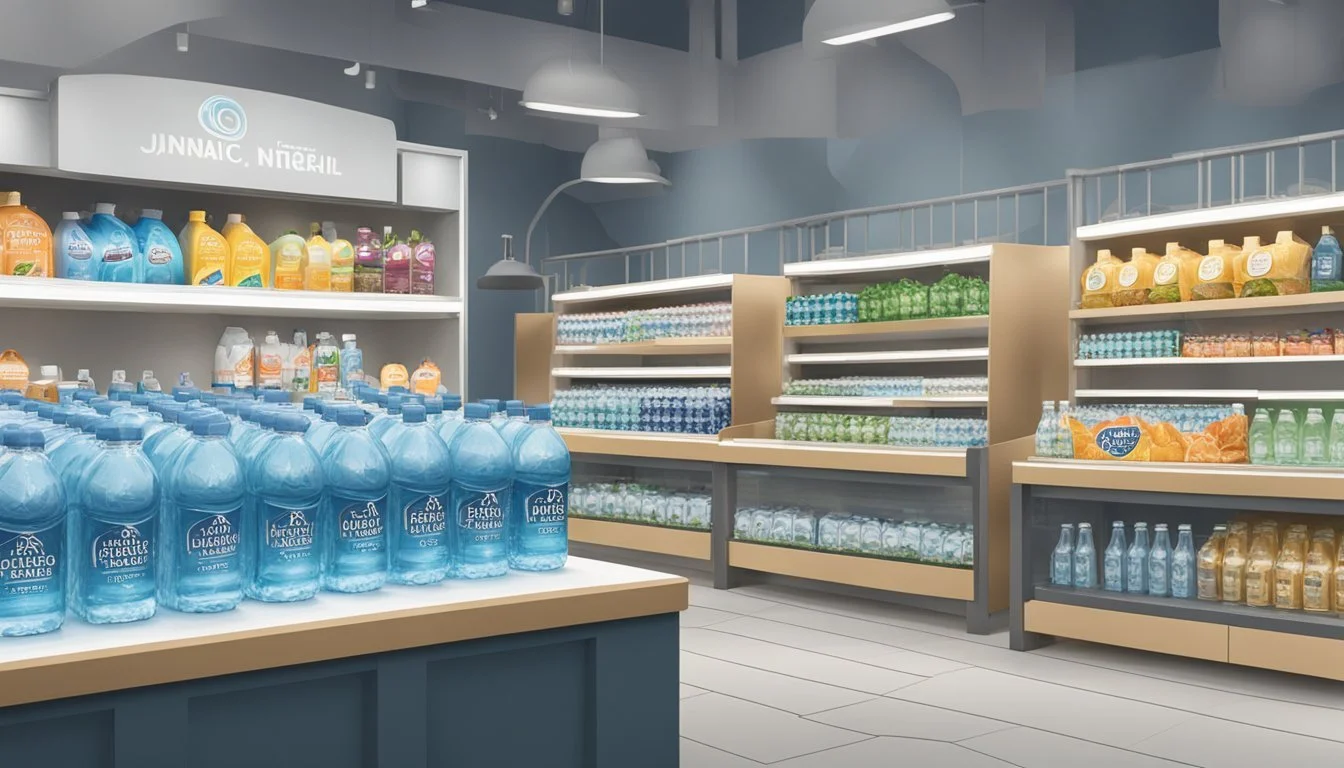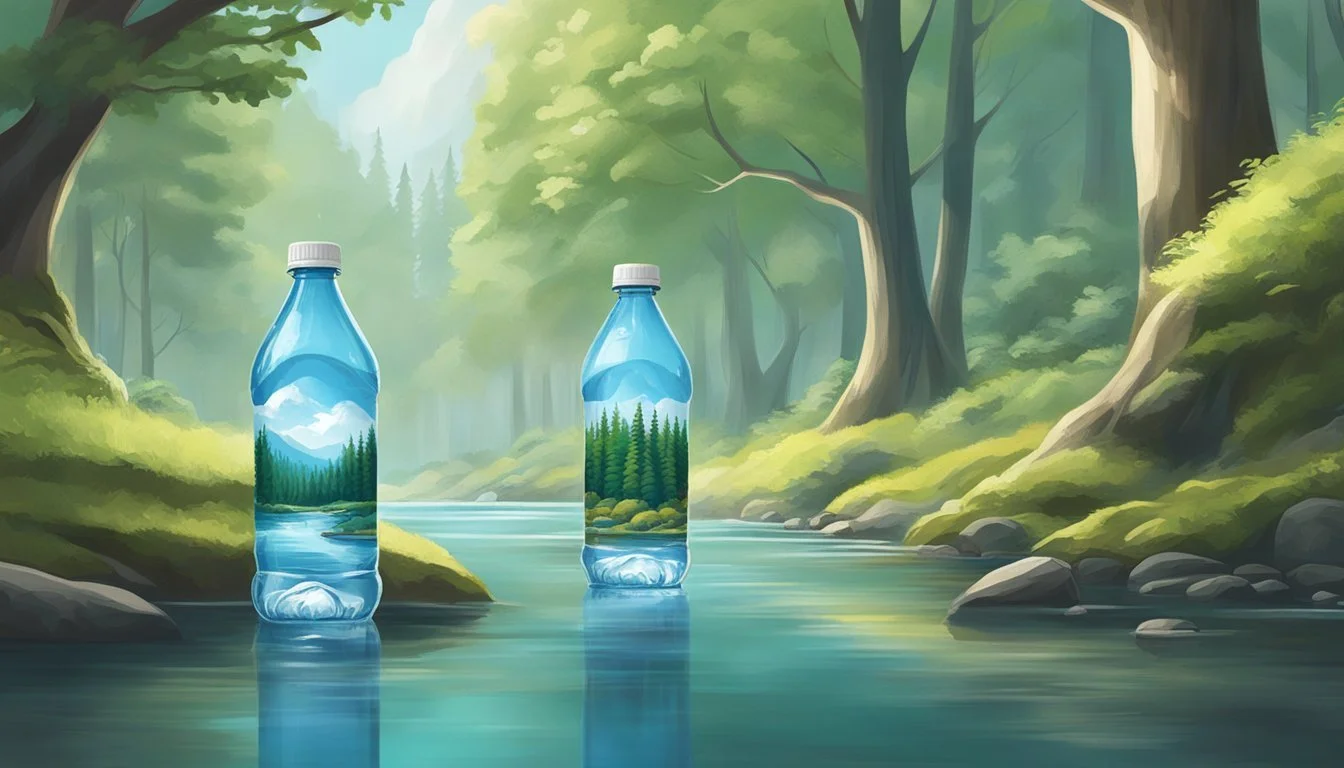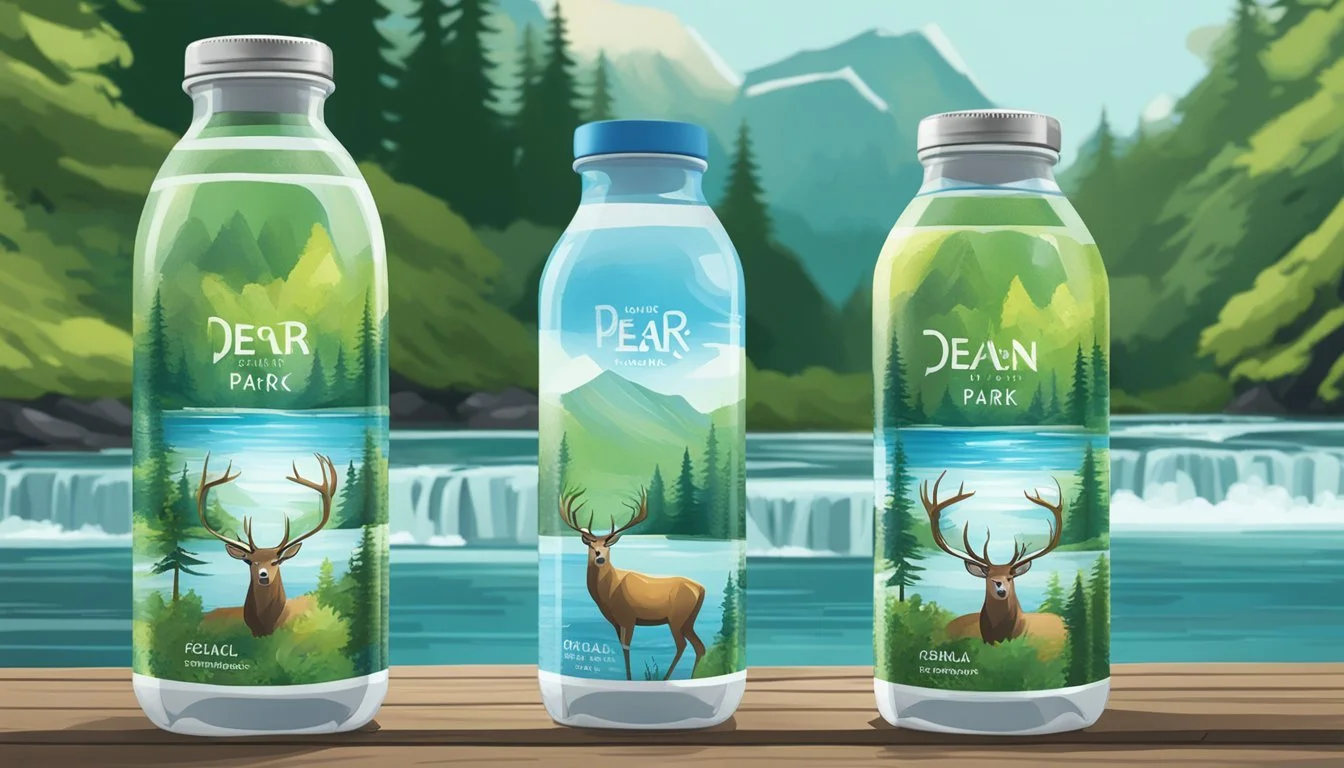Deer Park vs. Icelandic Glacial
Comparing Quality and Taste in Bottled Water
When it comes to choosing bottled water, consumers are often faced with an overwhelming variety of brands and claims of superiority. Deer Park and Icelandic Glacial are two brands that frequently come to the forefront of such discussions. Deer Park, originating from springs in the United States, is known for its accessibility and presence in the American market. Icelandic Glacial, sourced from Iceland's legendary natural springs, brings an exotic appeal with its promise of pristine, untouched water.
Despite their different origins, both brands have their dedicated followers and have sparked debates over which provides the better hydration experience. On one hand, Deer Park is often highlighted for its regional sourcing and familiar taste profile. On the other hand, Icelandic Glacial touts its exceptional purity and sustainable bottling practices, making it stand out in the increasingly environmentally-conscious consumer market.
The decision between Deer Park and Icelandic Glacial is not just a matter of taste but also encompasses factors such as the presence of contaminants, environmental impact, and packaging. Studies and consumer reviews frequently scrutinize bottled water brands for these aspects, shaping public opinion and influencing purchasing decisions. As consumers become more invested in the backstory and quality of their bottled water, the debate between Deer Park and Icelandic Glacial remains a relevant topic of discussion.
Overview of Bottled Water Industry
The bottled water industry has experienced significant growth, emerging as a major segment within the beverage market. It represents consumers' increasing preference for convenience as well as perceptions of purity and health benefits associated with bottled water.
Significance of Bottled Water
Bottled water has become a staple in modern consumption, often marketed for its convenience and perceived health advantages over tap water. The industry's expansion can be attributed to a rising consumer demand for hydration options that are believed to be safer and of higher quality than municipal water supplies. The growth rate of the bottled water industry outpaces that of other beverages, with an annual expansion estimated at 8% to 10%.
Leading Water Brands
A variety of brands dominate the bottled water market, with offerings that range from spring water to purified and enhanced water products. Notable brands include Deer Park, known for its 100% natural spring water sourced from the Eastern Seaboard, and Icelandic Glacial, which is praised for its rich and refreshing water exported from Iceland. The presence of these brands indicates consumers' diverse preferences and the competitive landscape of the bottled water industry.
Role of Companies in Water Quality
Water quality is a critical selling point for bottled water companies. It is the responsibility of each brand to ensure the purity and safety of their products. For instance, Deer Park claims to offer natural spring water, emphasizing crispness and clean taste. Likewise, companies are scrutinized for the environmental impact of their products, as seen in studies evaluating microparticle contamination from plastic bottles. This level of responsibility underlines the importance that brands place on adhering to strict quality control measures to maintain consumer trust and industry standards.
Deer Park and Icelandic Glacial Comparison
In this comparison, the focus is on the brand heritage, the sources of water, and the distinctive taste profiles of Deer Park and Icelandic Glacial. These elements are crucial in determining which bottled water might be better suited to individual preferences.
Brand Background
Deer Park enjoys a long history, having been established in 1873, and has been delivering spring water in the United States for over a century. It’s a widely recognized brand in the eastern U.S., where it sources its natural spring water.
Icelandic Glacial, on the other hand, is a relatively younger brand, yet it has quickly established itself as a premium bottled water provider. Originating from Iceland, this brand prides itself on sustainability and providing what they claim to be the cleanest-tasting water on the market.
Water Source and Quality
Deer Park sources its water from springs across the American East Coast. Its water goes through natural filtering processes and is regularly tested to adhere to quality standards.
Icelandic Glacial’s water hails from the Ölfus Spring in Iceland, a region touted for its exceptionally pure water. A low mineral content and natural alkalinity characterize their product, making it stand out as a premium water option. The environmental sustainability of their source is a significant element of Icelandic Glacial's brand promise.
Brand Source Mineral Content Alkalinity Deer Park Natural springs in the U.S. Natural minerals Varies by source spring Icelandic Glacial Ölfus Spring, Iceland Low mineral content Naturally alkaline
Taste Profiles
The taste of Deer Park water is often described as clean and refreshing, with a flavor that reflects the minerals of its various regional sources. The brand offers both still and sparkling varieties, which may appeal to consumers looking for options in water taste and texture.
Icelandic Glacial boasts a taste that many find uniquely crisp and almost silky due to its low mineral and high pH (alkaline) levels. It’s often preferred by those who enjoy a smooth, clean water without the mineral aftertaste.
Taste Comparison:
Deer Park: Clean, reflects regional minerals, option for sparkling water.
Icelandic Glacial: Crisp, low mineral aftertaste, smooth feel.
Health and Safety Standards
When comparing Deer Park and Icelandic Glacial, assessing health and safety standards is crucial. These standards ensure that consumers are provided with safe drinking water that meets specific regulatory requirements.
Regulatory Bodies and Standards
Deer Park and Icelandic Glacial bottled waters adhere to regulatory standards set forth by the Food and Drug Administration (FDA) in the United States. The FDA sets standards similar to those of the Environmental Protection Agency (EPA) for public water systems. The Icelandic Glacial brand, being sourced and bottled in Iceland, also complies with European regulations, which are often considered stringent.
FDA Standards: Both brands must meet the FDA's standards for bottled water, including limits on contaminants.
EPA Regulations: The water quality, including standards for contaminants like lead, is also influenced by EPA regulations in the U.S.
Contaminants and Safety Concerns
Contaminants such as microplastics, heavy metals (including lead, arsenic, and mercury), and PFAS chemicals can affect water safety. Both Deer Park and Icelandic Glacial undergo testing to ensure that these contaminants stay below the levels considered harmful.
Deer Park: Tests for microparticle contamination, including microplastics, are conducted.
Icelandic Glacial: The source, Ölfus Spring, is naturally filtered and has low levels of contaminants due to Iceland's low pollution levels, reducing the presence of PFAS and heavy metals.
Health Benefits of Different Water Types
The quality and type of water can provide various health benefits:
Mineral Content: Icelandic Glacial is naturally alkaline with essential minerals. These can contribute positively to a person's health.
Purity: Deer Park's source waters are filtered through geological formations, providing a pure form of water with its own health benefits.
Both brands offer distinct health benefits through their unique sources and bottling processes, emphasizing the importance of choosing water that meets individual health preferences and safety standards.
Environmental Impact and Sustainability
In comparing Deer Park and Icelandic Glacial bottled waters, it's critical to assess their environmental impact and sustainability practices. This includes examining the use of plastics and recycling efforts, the overall carbon footprint, and the companies' specific sustainable bottling practices.
Plastic Use and Recycling
Deer Park utilizes plastic bottles for its water, as do most bottled water companies. These plastics can contribute significantly to environmental pollution if not recycled properly. Deer Park encourages consumers to recycle but the effectiveness of these programs varies regionally according to local recycling capabilities. Icelandic Glacial, on the other hand, promotes its use of 100% recyclable packaging and actively engages in initiatives to minimize plastic waste.
Icelandic Glacial: 100% Recyclable Packaging
Deer Park: Encourages Recycling
Carbon Footprint of Bottled Water
The transportation of bottled water inevitably generates carbon emissions, which affect the brand's overall carbon footprint. Icelandic Glacial claims to be carbon-neutral through a combination of sustainable practices and carbon offsetting. Its water bottling operation is powered by geothermal and hydroelectric energy. Deer Park has made commitments to reduce its carbon footprint, including reducing the amount of plastic in its bottles and improving the efficiency of its operations.
Icelandic Glacial: Carbon-Neutral, Geothermal and Hydroelectric Energy
Deer Park: Reduced Plastic, Efficiency Improvements
Sustainable Practices in Bottling
Sustainability in bottling involves more than just the end product; it encompasses the entire bottling process, from sourcing to packaging. Icelandic Glacial's bottling facility reportedly operates entirely on sustainable geothermal energy, which minimizes its reliance on fossil fuels. Furthermore, its source, the Ölfus Spring in Iceland, is naturally replenished, which helps to ensure long-term sustainability. Deer Park sources its water from springs across the United States and has implemented various initiatives to protect the water sources and surrounding environments.
Icelandic Glacial: Geothermal Energy, Naturally Replenished Source
Deer Park: Initiatives to Protect Spring Sources
Consumer Factors
Choosing between Deer Park and Icelandic Glacial bottled water involves considering various consumer factors such as convenience, price, and individual preferences.
Convenience and Lifestyle
For consumers looking for ease of purchase, Deer Park may offer a higher degree of convenience due to its wide availability in the United States. It's commonly found in supermarkets, convenience stores, and vending machines. On the other hand, Icelandic Glacial, labeled as a premium water brand, could be less accessible and might cater more to those who prefer specialized or high-end retail distributors.
Price Comparison
When comparing the price, Deer Park is generally more affordable, making it an appealing choice for budget-conscious buyers. In contrast, Icelandic Glacial is often positioned as a luxury brand:
Brand Price Range (per bottle) Deer Park $1.00 - $2.00 Icelandic Glacial $2.50 - $4.00
These prices may vary based on location and retailer but present a general view of the cost difference between the two.
Consumer Preferences and Trends
Individual preferences also play a pivotal role. Icelandic Glacial boasts of a high pH level and purity, which might align with the trends of consumers seeking alkaline diets or more natural products. Deer Park, being a familiar and popular brand, might be preferred by those valuing a more traditional taste and brand loyalty. In recent consumer trends, there's been an increasing interest in sustainable packaging, which is something these brands are responding to at varying levels.
Advanced Filtration Technologies
When comparing the filtration technologies of Deer Park and Icelandic Glacial, the distinction rests in the specific processes they employ to ensure purity and taste. Deer Park utilizes Reverse Osmosis, while Icelandic Glacial boasts its proprietary Hydro-7 Filtration method.
Reverse Osmosis Process
The Reverse Osmosis process used by Deer Park involves water passing through a semi-permeable membrane. This method effectively removes impurities, including dissolved solids, making for clean and distilled water. Reverse osmosis not only purifies but also slightly demineralizes the water, sometimes necessitating the addition of minerals to enhance the flavor and alkalinity.
Hydro-7 Filtration
Icelandic Glacial employs a unique filtration process known as Hydro-7, which is a series of seven stages that the water undergoes before bottling. This process helps retain the natural alkaline properties of the water, providing a pH level typically above 7, resulting in alkaline water. The Hydro-7 Filtration does not involve reverse osmosis; instead, it emphasizes preserving the water's natural mineral balance while removing contaminants.
Differences in Filtration Methods
The primary differences in filtration methods between Deer Park and Icelandic Glacial are their focus and the end product. Deer Park’s Reverse Osmosis targets a broad spectrum of impurities, leading to a product that is clean but may lack certain beneficial minerals. In contrast, Icelandic Glacial's Hydro-7 Filtration is designed to maintain the water’s natural mineral content and alkaline pH, which are considered desirable by many for taste and potential health benefits.
Comparison of Water Types
In the quest to understand water quality and preference, one must consider the differences between tap water and bottled varieties. This section dissects the core distinctions involving Deer Park and Icelandic Glacial bottled waters, tapping into their sources and types.
Tap vs. Bottled Water
Tap Water is the most accessible form of water in urbanized areas, supplied from municipal sources and treated to remove contaminants to meet safety standards. It's affordable and environmentally friendly due to the absence of packaging.
Bottled Water, including brands like Deer Park and Icelandic Glacial, often touts superior quality with its spring or mineral water origins. Deer Park claims 100% natural spring water from the Eastern Seaboard, while Icelandic Glacial boasts of mineral-rich water from Iceland's pristine ecosystems. Consumers may prefer bottled water for perceived purity, taste, and convenience, despite its higher cost and environmental impact from plastic bottles.
Spring Water vs. Mineral Water
Spring Water emerges from underground sources and must flow naturally to the earth’s surface to be collected or be pumped through a sanitary borehole. Deer Park is an example that is categorized as spring water.
Mineral Water springs from a mineral-rich underground water source, and no minerals can be added to the water. Icelandic Glacial, sourced directly from Iceland, is classified as mineral water, which must contain a constant level and relative proportions of minerals and trace elements.
Carbonated and Flavored Water Trends
Carbonated Water sees an upward trend as consumers seek variety in their water consumption. The carbonation process involves dissolving carbon dioxide gas under pressure to create a fizzy beverage, an option not represented in Deer Park or Icelandic Glacial brands.
Flavored Water adds a twist to traditional water by infusing it with flavors and, occasionally, sweeteners and other additives. This is a growing market segment as consumers look for healthier alternatives to sugary drinks, although it's important to be mindful of any added ingredients that could detract from the water's health benefits. Neither Deer Park nor Icelandic Glacial is known for flavored water offerings, as they maintain focus on providing pure, unaltered water.
This section provides insights into the contrasting characteristics of tap versus bottled water, the nuances between spring and mineral waters, and the emerging trends of carbonated and flavored waters within the industry.
Future of Bottled Water
The bottled water industry is rapidly evolving, with advancements in bottling technology, shifts in consumer demand, and increased focus on educational initiatives about product choices.
Innovations in Bottling
The bottled water sector continues to integrate innovations to stay ahead in terms of sustainability and convenience. Biodegradable bottles and plant-based plastics are entering the market to address environmental concerns. They are also experimenting with new filtration and purification technologies to enhance water quality and safety.
Market Trends and Projections
The market trends indicate a growing preference for water sources with a low environmental footprint, such as companies like Icelandic Glacial that boast naturally alkaline water bottled at the source. Consumer demand is shifting towards products that not only offer quality but also transparency in their sourcing and production. Consequently, brands like Deer Park are leveraging their natural spring water appeal.
Consumer Advocacy and Education
Education is becoming a cornerstone of the industry, with companies and consumer groups advocating for more informed choices. Details about source, quality, and sustainability practices are increasingly sought by consumers, guiding their purchasing decisions. Consumer advocacy groups are pushing for more stringent labeling standards, ensuring that claims like "100% natural spring water" are verifiable.
The relationship between bottled water brands, consumer trends, and sustainability practices stands to reshape the future of the bottled water industry.
Conclusion
When comparing Deer Park and Icelandic Glacial bottled waters, consumers have distinct choices based on quality, sourcing, and taste profile. Icelandic Glacial has a reputation for having a clean and refreshing taste, sourced directly from Iceland's natural springs. It is often praised for its purity. Meanwhile, Deer Park is known for its accessibility and affordability, sourced from various springs across the United States.
Taste
Icelandic Glacial: Rich mineral content, providing a unique and refreshing flavor.
Deer Park: A taste profile that reflects its regional spring sources, which may vary.
Purity
Icelandic Glacial: Claims to offer exceptionally clean water due to the natural filtration of the Icelandic springs.
Deer Park: Adheres to FDA regulations for bottled water but does not emphasize purity to the extent of some premium brands.
Environmental Considerations
Icelandic Glacial: Utilizes sustainable practices, boasting a CarbonNeutral certification.
Deer Park: Offers some products in recycled bottles, aiming to reduce plastic use over time.
Availability
Icelandic Glacial: May be less accessible in certain markets.
Deer Park: Widely available across the United States.
Each brand has its strengths: Icelandic Glacial for its quality and sustainability efforts, and Deer Park for its widespread availability and cost-effectiveness. The choice between the two ultimately depends on the consumer's priorities, whether they value taste and purity or accessibility and price.









